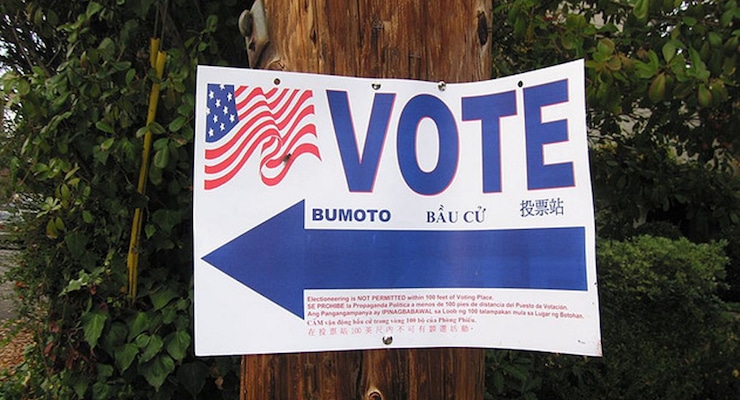

File photo of a California polling place sign. (Credit: Ho John Lee/flickr via Creative Commons)
There’s a not-insignificant part of the United States known as the West Coast. It includes such prominent states as California, Oregon and Washington.
These states have yet to hold a single presidential primary or caucus. But at 8 p.m. Eastern Daylight Time on Tuesday, this population center of 50 million-plus souls was informed that the Democrats have a “prohibitive front-runner” and the Republicans a guy who seems unstoppable by primaries and caucuses alone.
As of this late date in the process, not a single voter in a state bordering the Pacific Ocean has been asked to choose the “winner” — except for Republicans in Hawaii and Alaska.
Washington will have its Democratic caucuses later this month, its Republican primary in May. Oregon doesn’t hold its primaries until May, and California’s are in early June.
When these states do go through the motions of expressing their preference for the next president, they will have done so without months of public agony over matters of regional concern. Their voters will have heard only sketchy talk on issues related to shipping, fisheries or water shortages plaguing the eastern parts of the three states.
And even if the delegate counts remain close, voting late in the season leaves the electorate with a reduced list of possibilities. On the Republican side, there’s no more Jeb Bush or Marco Rubio. On the Democratic side, Martin O’Malley is gone. Bernie Sanders will probably still be running, but his West Coast supporters can no longer affect the perception of his being in a close race with Hillary Clinton.
Noting this unfairness, Washington state officials, backed by The Seattle Times, are calling for a new system that would give every part of the country an even shot at choosing the parties’ nominees. A “rotating regional primary system” would group states into four regions. Every four years, a different region would kick off the voting.
Both parties already encourage regional primaries, notes Kay Stimson, spokesperson for the National Association of Secretaries of State. But they have hesitated to endorse a system of rotating regional primaries, which the association first proposed in 1999.
Because some regions tend to be highly liberal or highly conservative, some worry that clustering primaries by region would skew the results toward one political bias or another. Another concern is that holding large regional votes at the same time would put poorly funded candidates at a disadvantage.
Interestingly, the rotating primary plan would retain first-in-the-nation privileges for Iowa and New Hampshire. The association members saw value in the retail politics of both states, Stimson told me. It lets average people vet the wannabes — and gives poorly funded candidates a chance to grab a foothold.
A competing proposal is to set a national primary date for everyone to vote. The problem here, Stimson explains, is it vastly favors the most heavily endorsed front-runner candidates. In this year’s race, she said, the choices would have been Jeb Bush and Hillary Clinton “and that’s that.”
A rotating regional primary system still seems the fairest and simplest way to avoid the rush to the front of the line we see today. And it remains utterly crazy that giant California can become an afterthought in the selection of party nominees.
If this is any consolation, other big-population states — New York, Pennsylvania, Arizona, Indiana — have yet to hold primaries or caucuses. And the very last group of Americans to choose delegates will be Democrats in Washington, D.C. Their primary will be held June 14.





